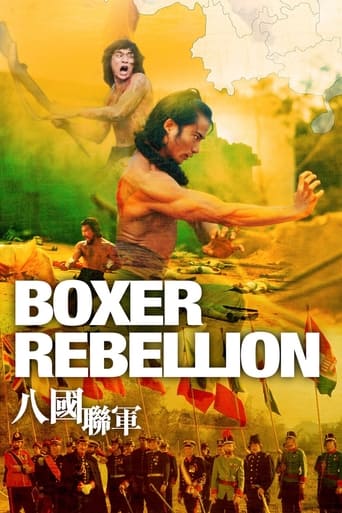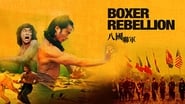dafrosts
I do not are that the costumes were wrong or that a Colt 1911 wa used 11 years before it was developed. My concern is the plot and whether the dialogue can keep things flowing. There are some choppy moments in this, but most movies have them. I was impressed that once more Chi Kuan-Chun (Shui Feng-Yun), my go-to Kung Fu Movie actor, plays a stoic character capable of seeing both sides of the issue. Alexander Fu Sheng (Tseng Hsein-Han) is Feng's Blood Brother, who wants justice for China. Everyone in a leadership position in this movie has an agenda. The Foreigners want to split up China into tiny pieces for themselves. The Dowager Empress wants someone to fight for China, even if its the Boxers, who are definitely seeking power. The local Boxer leader, Lung-Wei, is out for power and is willing to sacrifice all who come to fight in the name of China to get it. The Boxers tell followers that their "spells" can make them immune to the foreigners' bullets. It's total crap, but people fall for it. The Boxers do have a Kung-Fu style that makes them "immune" to typical Chinese weapons. It takes YEARS to master. Innocents are collateral damage to both sides of the Rebellion. The first "battle" Feng & Tseng encounter is more a sacrifice of fellow Chinese to Japanese guns. Hundreds are killed by Gatling guns. Swords are not exactly the best defense against bullets. Even Feng's friend Chen knows he won't return from the "battle" but has go to avenge his fallen brother. People pan this movie and Martial Arts films for their view of foreigners. It is no different than how American Westerns Portray Native Americans as the enemy. It should be expected these will be shown from the Chinese POV. I am not sure what "sugar" some reviewers say in this movie. There was definitely a lot of blood being spilled. Mainly, Chinese, for the benefit of others. Feng and Tseng defend fellow Boxers against Japanese who have followed from the battle. 9 Japanese are killed in the process. Feng and Tseng leave with the surviving Boxers. Lung-Wei's character encounters the aftermath as more Boxers appear. He takes credit for the Japanese deaths in an attempt to perpetuate his "spell" is working. The 9 dead Japanese quickly inflates to 90 then 900 then 9000 as news of the "battle" heads toward the Dowager Empress in Peking. Feng, Tseng, Lung Wei and other Boxers are invited to visit the Empress and "show off" their skills. Feng and Tseng have to watch in silence as Brother Boxers are killed in demonstrations of being "immune" to Foreign weapons. The pain of WAR's reality is ever visible in Feng's eyes. The reality that killing an enemy soldier will not stop the War and may result in more enemy attempting to get a foothold in China. weighs very heavy upon him. He also learns someone he once trusted has secrets of her own that make the situation worse. Feng and Tseng become trapped in Peking with only one foreseeable way out between the Boxers and the Foreigners. They become Public Enemy #1 for standing up to the German "in charge" of slicing up Peking and all of China. Feng and Tseng make a plan to head South for reinforcements no matter which makes it out of Peking. Feng is well aware they may die in the process. The loss of one to save millions is what must happen. Some refer to this as the Godfather of Kung-Fu movies. I like this movie far better than the Godfather series. Another reason I like it is it is a Who's Who of Shaw Brothers actors. There are several familiar Shaw faces, aside from Chi and Fu, in this film. Their presences actually move the story along and are not just there to being a movie, like some films who use actors for cameos.
Leofwine_draca
BOXER REBELLION is an oddly drawn-out Shaw Brothers epic telling the story of the uprising against German and Japanese forces at the beginning of the 20th century. By all accounts this should be a fantastic movie along the likes of 14 AMAZONS or THE WATER MARGIN, but somehow it isn't, despite the all-star cast and presence of Chang Cheh in the director's chair. The story feels lightweight and drawn out, dragging its feet in between the action scenes.The good news is that, as is the normal for Shaw, the action is absolutely fantastic and that alone makes the film a worthwhile watch. In essence the plot is about three kung fu heroes - Shaw regulars Alexander Fu Sheng, Beardy, and Chi Kuan-Chun - who decide to help fight back against oppressive foreign forces, using their superior martial arts skills. How will fists and feet go against rifles and bayonets? You'll have to see it to find out, but the action is visceral and acrobatic and hugely entertaining.The rest of the movie is a hit and miss affair. Scenes involving the Empress Dowager are routine and unnecessary in my opinion. A sub-plot about the fighters' belief that they are in some way magical is very interesting and the climax to that plot well-handled. Richard Harrison, returning to Shaw after MARCO POLO, plays an honourable villain with aplomb, and regular star Wang Lung Wei does well as something other than a stock bad guy. On the other hand, the location shooting in Taiwan makes this look cheap and unconvincing at times, with the same sets redressed over and over, and the sluggish nature of the narrative stops this from being an outright classic.
poe426
BOXER REBELLION starts off well enough, with several kung fu men (led, more or less, by Chi Kuan-chun) arguing that it's folly to bring a knife to a gun fight; the Foreign Devils have Gatling guns, while the Chinese freedom fighters are armed only with swords and spears (and, well, Magic that protects them from bullets...). Logical argument- but then Chang Cheh gives us a scene in which a kung fu man charges a machine gun nest, takes a burst full in the chest, wrestles the weapon away from the machine gunners (taking another burst full in the chest as he does so) and then proceeds to beat them to death with their own automatic weapon. WTF...? Having heard the rather sensible argument that such a thing wasn't possible, we then see that it IS possible (at least in this movie, though the actual freedom fighters fared less well against the coward's weapon- the Gun). The first half of the movie is often slow, but it heats up in the second half when Kuan-chun and Fu Sheng set about harassing the occupying forces. Well worth seeing, though some viewers may wonder why it takes our heroes so long to get in gear.
emverano
This movie was just another convenient vehicle for Hong Kong movie producers and writers to indulge in their Sino-centric and xenophobic fantasies. ("Once Upon A Time In China I, II, and III" are some other recent examples of these Sino-centric fantasies.) These Sino-centric movies invariably portray Chinese as quasi-saintly, self-sacrificing heroes while portraying most foreigners as black-hearted villains. This movie did just that. The leaders of the Boxer Rebellion were portrayed as pure-hearted heroes while the foreigners (especially Japanese, Russians and Germans) were portrayed as one-dimensional greedy idiots. As many of us know, political struggle and war are not battle between totally good and totally evil. The world is more complex. The real world is filled with shades of gray, not just black and white. It is clear even to the most unsophisticated movie goer that the simplistic, one-dimensional portrayal of the Boxer Rebellion in this movie absolutely lacks credibility. Moreover, this good-guy portrayal of the leadership of the Boxers is contrary to the historical evidence. Historically, although some of the leaders of the Boxer Rebellion were indeed pure-hearted patriots, the barbaric deeds committed by the Boxers and their leadership are historical proof that most of the Boxers and their leaders were merciless zealots who had no scruples about massacring defenseless women, children and babies.During the screening of this movie, not only did I question the validity of the plot and characterization, but I wondered if Hong Kong movie producers hire historical consultants? I used to think Hollywood's historical inaccuracies were bad, but the historical inaccuracies of some Chinese movies are just awful!! IMDB comment section is just too short to mention all the blatant inaccuracies of this film, but I shall mention some of them: 1) Why were American soldiers and officers wearing Civil War era uniform? The American soldiers who were sent to Beijing during the Boxer Rebellion wore uniform totally different from the ones worn during the Civil War. (They probably wore khaki hat and pants and dark blue shirts, a uniform similar to those of the Rough Riders.) 2) The Russian uniform is totally inaccurate. The uniform in the movie does not even resemble the real uniform. 3) A Japanese naval officer in the movie had shoulder length hair. Japanese naval officers were not allowed to have shoulder length hair. 4) Why were so few Chinese in the movie wearing the so-called "pigtail" (or queue)? In spite of the portrayal of this movie, vast majority of the residents of Beijing during the Boxer Rebellion were required to arrange their hair in the Manchu style (i.e. pigtail). Most Chinese men did not cut their pigtail until 1910's or 1920's.Many people say a movie goer should not be too rational if he or she wants to enjoy a movie. However, with such a plethora of historical inaccuracies and incredible character portrayals, no logical human being can fully enjoy this kind of movie. Such a cheap plot and shallow characterization should not even belong in a cartoon.





